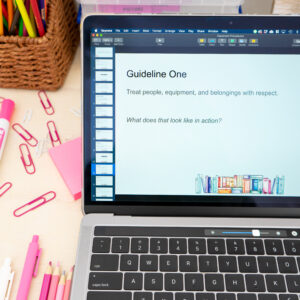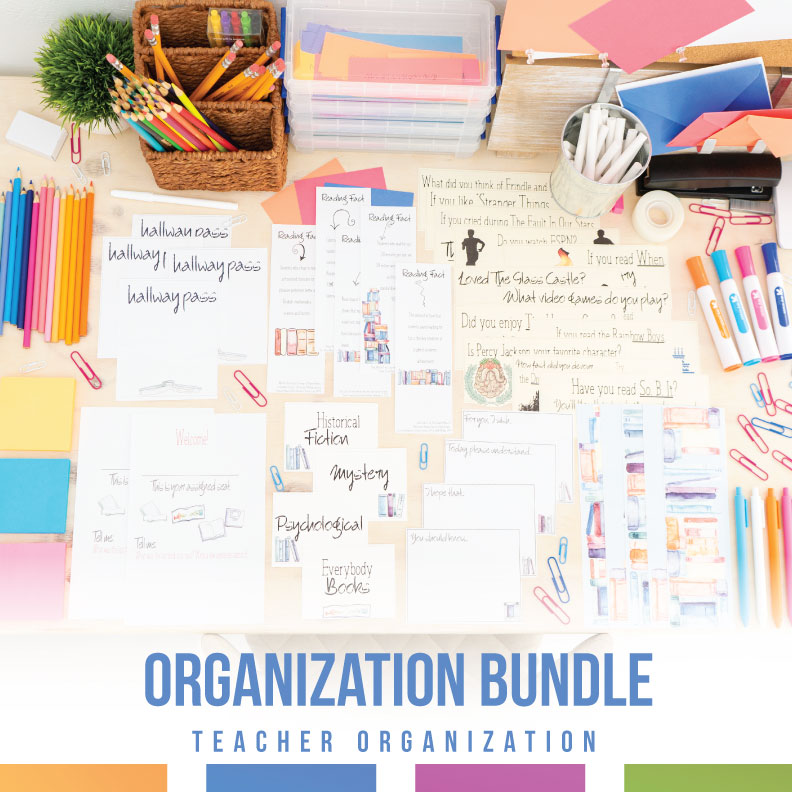What advice would you give a new language arts teacher?
Somewhere, new teachers are finishing their student-teaching assignments and interviewing. Middle school and high school English language arts teachers are a special bunch, ready to tackle comprehension, grammar, and the rest of an English curriculum.
A first year teacher is born—the newness, the excitement, the work, the lesson planning.
I’ve started new teaching jobs which entailed a new classroom and curriculum set-up on my part, twice. As a new English teacher, you will encounter lots of obstacles.
How can a new language arts teacher thrive?
First year teachers, I’m not going to lie. It’s work. It’s sweat. If you’re like me, you might cry a few times. You can do it though with support, plans, and practical ideas. Take care of your health, and build relationships with other teachers.

If next year will be your first year teaching, this is my advice for the new language arts teacher.
1. Get a big picture as soon as possible.
Not for your wall, but in your head. How will you organize your language arts classes?
Talk to your department chair or coworker who will give you accurate information. Ask for a book list, a curriculum map, and grade/class objectives. If you don’t have a clear picture of parameters for the school year, it is ok to clarify. If there are none, you may be responsible for creating them. Take into account what student books you have, teaching materials, and other resources when outlining the year.
As a new English teacher, familiarize yourself with the standards for your state. Then, ask questions about the legalities concerning your classes, like special education and second language circumstances. You want to serve all of your students.
If you are replacing a retiring teacher (or the previous teacher is willing to speak with you), ask questions. Ask if you can have materials (you can decide what works for you later). This person can provide great insight into what you’ll experience at that particular school.
Special note about ELA curriculum:
Would some editable pacing guides help you as you begin planning your first language arts classes? You can make a copy of these materials and edit as you wish:
- English 9 (typically, freshmen language arts)
- Creative Writing
- American Literature, unit one and unit two

2. Find support.
Fortunate first year teachers will have supportive coworkers, an advisor, and maybe a mentor. Other times you may need to seek support. Find teacher support groups on Facebook or Google. You can also create one. If you recently graduated college, invite your peers to join.
Teacher blogs and Twitter are also great sources of wisdom. You’ll see different perspectives and most people will give honest advice. Plus, if you have a special endorsement or specific question, you might find another teacher for support.
A caveat: not every teaching community is the same, and not all teachers have the same teaching philosophy as you. The Internet brings attention to lots of voices, but they are not all equal. Use the analytical skills from your degree to find your own community of teaching professionals.
3. Know your limits.
Your first year teaching will be a test of limits. Be cognizant of professional and personal boundaries that fit your life. When I started teaching, I figured my body would adjust to six hours of sleep. That didn’t happen. I would come home after work and fall asleep grading papers. I ate dinner at 10:00 at night and couldn’t fall back to sleep. It was a mess and it took me too many months to realize I wasn’t a machine and needed a schedule in my life that worked for me. The schedule needed sleep.
The teaching profession takes and takes with very little support. Establish your boundaries. English education particularly is difficult because of the grading load.
Professionally, realize your ideal classroom won’t happen overnight or even at the end of your first year. Cultivating lesson plans, placing the final touches that students will always remember—it takes time. Half of teachers leave the classroom after five years for a reason. Don’t burn yourself out; give yourself room to breathe.
4. Spend wisely.
Unless the world changes, your first year teaching will not bring huge paychecks, and you will spend personal money on your classroom.
It can’t hurt, so ask if you’ll be reimbursed for classroom purchases. Some schools provide new teachers with a classroom set-up budget. Clarify what you are allowed to purchase with any funds: curriculum? supplies? materials throughout the year? Spend the money wisely. If not, decide what you are willing to spend of your own money. You may be able to borrow supplies from other teachers (bulletin board borders or posters) or create your own for less money.
If TpT existed my first year teaching, I would have purchased from it. (I’m dating myself—I’m old.) I do use it years later. Spend wisely—buy products with longevity and depth.
Finally, professional development is often online, like the MSELA Summit.
Ready to be an English teacher?
That first year is difficult, and no one should tell you differently. You can do it though, and you will succeed. Ask for help, be professional, and learn what capabilities you have.
Take care of yourself. That might look like taking personal days, exercising every day, or reading in your spare time.
Other ELA teachers, what advice for the new language arts teacher do you have? As a new English teacher, what do you wish you had known?
Are you looking for more ideas for establishing safe student and teacher relationships? My Pinterest boards cover teacher ideas from around the web.








